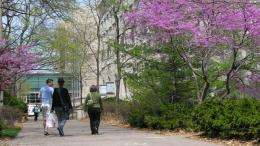The more you know a place, the more likely your memory will play spatial tricks

(PhysOrg.com) -- Many suburbanites remember a time when they were once city dwellers. For a time many returned to the city for dining, cultural and entertainment purposes. But over time the suburbs and "the city" seemed much farther apart thereby resulting in less frequent trips.
A new Northwestern University study is the first to show that something may be happening cognitively that leads people to gradually become more biased, and at the same time more accurate, when it comes to their spatial memory as they become more familiar with a particular area.
In other words, as people better understand the relationship between buildings on a campus, for example, over time memory biases cause them to exaggerate the distance between the north and south ends of campus. They become more and more biased and see the boundaries of campus as being much farther apart.
David Uttal, professor of psychology in the Weinberg College of Arts and Sciences, along with colleague Alinda Friedman at the University of Alberta, are lead authors of the study. They witnessed firsthand how this plays out among students on the Northwestern campus.
“I’ve had students tell me that they may be a few minutes late for class because they are coming all the way from south campus,” Uttal said. “And I’m thinking, ‘It’s only a six-minute walk.’
“Another time I overheard a student say, ‘This better be good, because I don’t go to north campus for nothing.’
“That really intrigued me because if you look at a map it’s not at all clear where these divisions are,” said Uttal. “There are north and south ends of campus but treating it like a really sharp division, like a foreign world, it’s not justified based solely on geography. I think there is something really interesting going on here cognitively.”
There have been other studies demonstrating the existence of spatial biases and how they affect spatial judgments, but Uttal said there were never studies about how such biases developed and how they were learned.
By studying Northwestern freshmen over three quarters and comparing them to seniors, Uttal said two significant findings emerged.
First, Uttal said, “We can get simultaneously more accurate and more biased at the same time, which seems counterintuitive, but it really shows how different kinds of information are stored and thought about differently in the mind.”
Secondly, Uttal and his colleagues were able to establish a time-course for when these biases develop, concluding that when people are new to an area, they are not inherently biased. They develop biases as they become more familiar with their surroundings.
However, it is still unclear how people acquire information that lead to such biases.
“Part of it has to be somewhat cultural – so as you become more part of a group, a ‘northsider’ or ‘southsider’ if you will, you hear more about these distinctions,” Uttal said. “It’s also kind of an interaction between what you learn from other people and what you learn on your own.”
Uttal said the study’s findings have implications for both the Northwestern University community and society at large.
“One of the goals of our campus is to bring people closer together and establish community,” he said. “However, it is possible that people's cognitive biases could actually make this hard. If people start to think of different areas on campus as being farther apart as they get more involved in Northwestern, then it might actually be harder to get people to think about ‘One Northwestern’ the longer they are here.”
In addition, the study’s findings may have desegregation implications.
“As other researchers have shown, in segregated areas, people may tend to believe that they are farther apart than they really are,” Uttal said. “And if we’re trying to bring people together, we have to address the cognitive biases that they create. You tend to see the area that you’re close to as closer and the areas that are socially and cognitively further from you as being geographically farther. “
“Learning Fine-grained and Category Information in Navigable Real-World Space” was published in the journal Memory & Cognition in December. The study’s co-authors, in addition to Uttal and Friedman, are Linda Liu Hand and Christopher Warren, Northwestern University.



















